What’s the problem? Why should I care? Using Media to Bring Science to the Public
Melissa Day, Dale Booth, Jia “Claire” Gao ·For some environmental researchers, science is about collecting knowledge. However, it is becoming increasingly necessary that scientists step up and share their work to inform policy and effectively manage environmental problems through public awareness. This requires that we learn how to use mass media outlets such as print, radio, television, and social media so that we can communicate clearly and effectively. Since no one knows the data or results better than the investigators involved, we have the responsibility to make sure that it is conveyed accurately. In honor of Earth Day, the ultimate public outreach effort, in today’s blog we will go over points scientists need to keep in mind when speaking to media outlets to get the real message across.
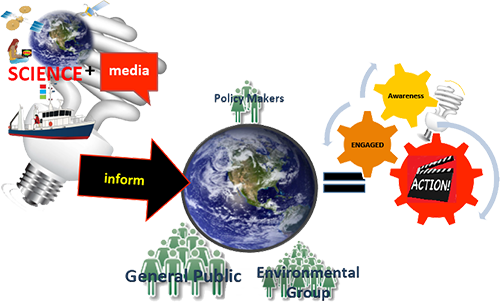
Critical Questions
First things first; ask yourself some critical questions: Is it newsworthy and timely? If it is interesting to you, it may or may not be interesting to an editor or a reader. For a story to be picked up by a news agency, it must actually be new, something no one knows about, or an angle that no one has considered. Is it relevant or does it have public interest? If you cannot make the average person understand how your information affects them, they are not going to care about it and your message will be lost. If it is not immediately obvious that your topic is relevant to public interest, try and find the context that makes it so. The “sexy” topics (coral reefs, sea turtles, cute baby animals , etc) are easier to sell but it must be the researcher’s job to “communicate the values of these ecosystems” and help the public see it.1 Are there implications or consequences of this knowledge? People want to know what the new information means and if it can be used to predict future events that impact them.
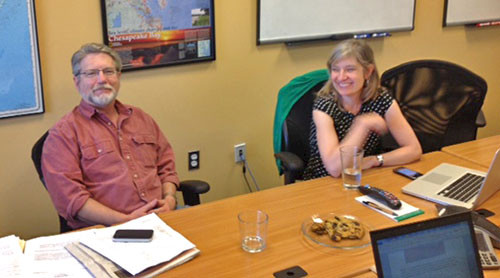
Get your facts straight
Tim Wheeler of the Baltimore Sun offered this advice to scientists when participating in an interview: Boil it down, don’t overstate. Science is done by human beings and they all think differently so share your data, examples and other quality supporting materials and don’t be afraid to recommend someone else with more expertise in certain areas. Tim also suggests, when giving an interview, don’t dodge but answer all questions and don’t speak on things you don’t know, that they’ll have to retract or correct later. With the increasing speed of news media, call reporters and journalists if you have an opposing viewpoint or something critical to share- place your caveats or limits on your knowledge. If you don’t know something, ask if you can get back to them shortly so you can have time to think about it. He also mentioned that, unfortunately, some science that is being shared is not vetted before being used to make policy decisions.
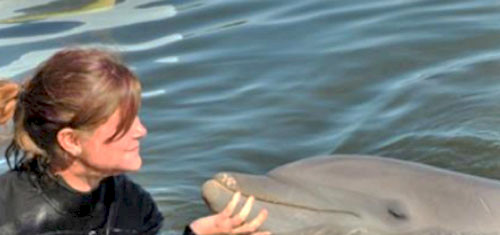
Choose your words wisely & tailor the message to the audience
Who are you trying to reach? Do you want to inform policy makers? Get the community involved in an environmental issue? You cannot talk to the general public the same way scientists might speak to each other. Science-y jargoned words are a no-no. Use metaphors to put new ideas into more familiar context. Also be aware that words have multiple meanings, and the public may have different interpretations of the words you choose. 4 But making your message understandable should in no way involve dumbing-down the message. Be understandable, but don’t talk down to your audience.
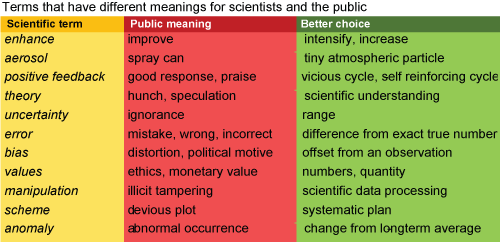
Break it Down
News is generally reported in sound-bites, and you have the best chance of getting meaning across if break your message into short concise statements that capture your ideas. This goes somewhat contrary to our scientific inclination to “explain”, but if you can get the ideas you want to communicate into a format that might be usable as a headline it has a higher probability of being usable and less chance of being misinterpreted or translated into something you didn’t intend to say.
The press release
A press release is a written statement to a media outlet on a news item, award, event or accomplishment- telling the Who? What? When? Where? Why? How? Amy advised that reporters are more likely to consider your story newsworthy if they first receive a press release.
Put some context in the opener and follow-up with quotes. Images and Illustrations are great. Have proper permissions to use images… and ALWAYS proofread!
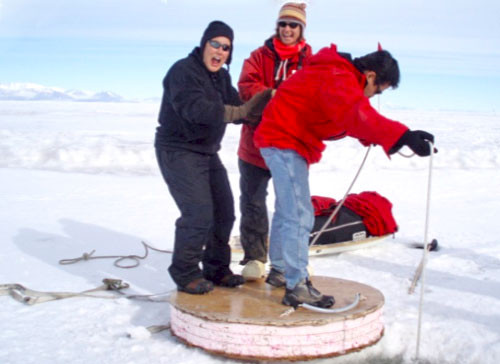
In conclusion
Practice makes perfect, and the more interviews you give the easier it gets. Once you have your science out there and receive feedback from sharing those ideas you can start to really make a difference. Now contact your public relations representative and start that press release.
Happy Earth Day!
Recommended Reading
AK Leight, Jia “Claire” Goa and Maureen Brooks. March 4, 2013 IAN Blog. Making Progress in Climate Change Requires Better Communication and Innovative Solutions.
Pictures of science in action were courteously provided by UMCES employees: Cecilia O’Leary and Eva Bailey.
Some symbols in graphics created by: Tracey Saxby, Integration and Application Network, University of Maryland Center for Environmental Science (ian.umces.edu/media-library/).
References
1. Duarte, C. M. , W. C. Dennison, R. J. W. Orth and T. J. B. Carruthers. (2008). The Charisma of Coastal Ecosystems: Addressing the Imbalance. Estuaries and Coasts. 31:233-238.
2. Longstaff, B. J. ; T. J. B. Carruthers; W. C. Dennison; T. R. Lookingbill; J. M. Hawkley; J. E. Thomas; E. C. Wicks; J. Woerner (eds) (2010). Integrating and Applying Science: A practical handbook for effective coastal ecosystem assessment. IAN Press, Cambridge, Maryland. Chapter 4: Communication Strategy.
3. Pelsinsky, Amy. Personal communications through conversational class lecture on Science in the media & PowerPoint on the press release. 2013 April 17. Amy is Director of PR at UMCES. Contact info: (410) 330-1389; e-mail: apelsinsky@umces.edu
4. Richard, C. J. Somerville and S. J. Hassol. “Communicating the Science of Climate Change. ” Physics Today, October 2011.
5. Wheeler, Tim. Personal communications through conversational class lecture on Science in the media: The interview and interviewee. 2013 April 17. Tim is a reporter at the Baltimore Sun Newspaper. contact info: (410) 332-6564 e-mail: tim.wheeler@baltsun.com
Authors
Melissa Day, Dale Booth and Jia “Claire” Gao
Next Post > Midshore Riverkeeper Conservancy report card launch
Comments
-
Atika 3 months ago
Thank you for sharing this great information with us, i really appreciate your post!